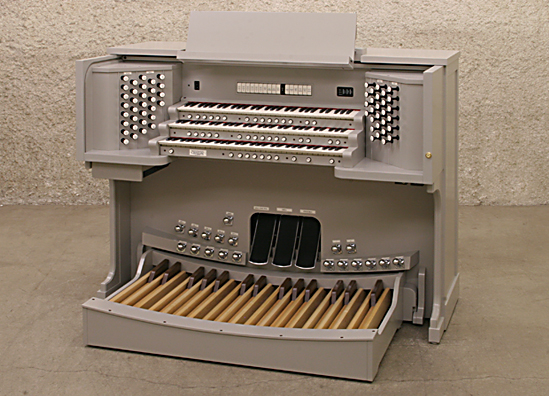Digital Organs
The two basic types of digital organ suppliers are Manufacturers and Micro-Assemblers, each with different capabilities and commitment to customers.
Organ Manufacturers build their instruments in their own factories. Micro-Suppliers are much smaller, doing little manufacturing, buying major assemblies from third-party suppliers. Often, even their tone generation technology is procured from a third party.
Organ Manufacturers
Allen Organ Company – Allen produces a larger percentage of their organs in-house than other builders. This, includes: consoles, pedalboards, drawknobs/stop controls, keyboards, tone generation circuitry, amplifiers, powers supplies, and more. Allen invented the first electronic organ in the late 1930s and the world’s first digital musical instrument (sampling technology) in 1971. Allen remains owned and managed by its founding family with manufacturing facility located in Macungie, PA, USA. https://allenorgan.com/
Johannus Organs – Johannus is a Dutch builder who began offering church organs with sampling technology about 20-years after Allen Organ Company introduced the first digital organ. They generally supply organs in the lower price ranges with a matching quality. They purchased Rodgers Organs of USA, and the smaller English builders, Copeman Hart and Makin. While these four brand names are offered, the quality of each have become less distinct. https://www.johannus.com/
Makin – Makin is a smaller builder that mainly sells in the United Kingdom and has been purchased by Johannus. Their website indicates that they have used various technologies over the years, but it is not clear on the source of their current technology, nor where the organs are built. https://www.makinorgans.co.uk/
Rodgers Instruments – Rodgers began producing organs in 1958. Since the 1970s Rodgers has had multiple owners including CBS and Steinway Pianos. In the late 1980s Rodgers was purchased by Roland of Japan and in 1991 began offering digital organs. Rodgers continues offering some of its digital organs based on Roland’s technology, even though in 2016 it was purchased by the group that owns the Dutch company, Johannus. Since its acquisition by Johannus, the Rodgers’ manufacturing facility and equipment have been sold and the company has morphed from a traditional manufacturer to an assembler. http://www.rodgersinstruments.com/
Viscount Organs – Viscount is located in Italy and entered the digital organ market about two decades after the introduction of the first digital organ. They offer organs at lower price points with matching quality. Viscount had previously distributed organs in the United States, through Baldwin Piano Company prior to that company exiting the organ business. It then distributed organs through Church Organ Systems, prior to that company going out of business. More recently, Viscount has established a number of retail dealers in America. While their marketing promotes physical modeling technology, some of their models use sampling and others use a virtual-type tone generation. https://www.viscount-organs.com/
Micro-Assemblers
Content Organs – Content is located in the Netherlands. Their organs are typically priced similar to Johannus and Viscount and with similar quality. In 2017, Content started building “stencil” organs now distributed in the U.S. by The Verdin Bell Company. Verdin has since exited the organ business. https://www.contentorgans.com/en/
Copeman Hart – Copeman Hart is located in England with few installations outside of the United Kingdom. While this company previous used Bradford tone generation technology, since being acquired by the Dutch firm, Johannus, it has not published information regarding its tone generation technology. https://www.copemanhart.co.uk/
Phoenix Organs – Phoenix Organs is located in Canada. According to published information, Phoenix purchases most of its assemblies from third-party suppliers. Their tone-generation technology is sourced from England and Phoenix’s website indicates they will be using Hauptwerk tone generation in the future. Phoenix uses aggressive marketing claims in promoting its products. In 2017 it was forced to retract false information. http://phoenixorgans.com/
Walker Technical – Walker has stated: “Walker produces electronic tonal enhancement equipment and speaker products, used by a large network of organ builders and dealers throughout North America.” Typically, Walker promotes its products through associations with local organists. http://www.walkertechnical.com/
Hauptwerk Organs – Hauptwerk offers software that enables PC’s to produce organ sounds. This approach requires the addition pf significant hardware to create a functioning organ. Various smaller suppliers and hobbyists offer solutions using this technology. These include Noorlander (Holland), VPO (USA) -now defunct), and Martin (USA) – non-defunct. https://www.hauptwerk.com/
